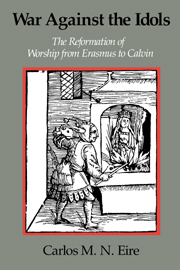Book contents
- Frontmatter
- Contents
- Acknowledgments
- Abbreviations
- INTRODUCTION
- 1 THE STATE OF LAY DEVOTION IN THE LATE MIDDLE AGES
- 2 ERASMUS AS CRITIC OF LATE MEDIEVAL PIETY
- 3 EARLY REFORMERS AND THE QUESTION OF IDOLATRY
- 4 ICONOCLASM, REVOLUTION, AND THE REFORMATION IN SWITZERLAND AND GENEVA, 1527–1536
- 5 HUMANISM AND REFORM IN FRANCE: THE SEEDS OF CALVINISM
- 6 JOHN CALVIN'S ATTACK ON IDOLATRY
- 7 CALVIN AGAINST THE NICODEMITES
- 8 FROM ICONOCLASM TO REVOLUTION: THE POLITICAL DIMENSIONS OF THE WAR AGAINST IDOLATRY
- CONCLUSION
- Index
3 - EARLY REFORMERS AND THE QUESTION OF IDOLATRY
Published online by Cambridge University Press: 02 October 2009
- Frontmatter
- Contents
- Acknowledgments
- Abbreviations
- INTRODUCTION
- 1 THE STATE OF LAY DEVOTION IN THE LATE MIDDLE AGES
- 2 ERASMUS AS CRITIC OF LATE MEDIEVAL PIETY
- 3 EARLY REFORMERS AND THE QUESTION OF IDOLATRY
- 4 ICONOCLASM, REVOLUTION, AND THE REFORMATION IN SWITZERLAND AND GENEVA, 1527–1536
- 5 HUMANISM AND REFORM IN FRANCE: THE SEEDS OF CALVINISM
- 6 JOHN CALVIN'S ATTACK ON IDOLATRY
- 7 CALVIN AGAINST THE NICODEMITES
- 8 FROM ICONOCLASM TO REVOLUTION: THE POLITICAL DIMENSIONS OF THE WAR AGAINST IDOLATRY
- CONCLUSION
- Index
Summary
At one point during the First Zurich Disputation, Ulrich Zwingli said the following about Protestant guidelines for religious reform:
We desire to speak of the truth [to find out], whether a man is bound by divine ordinance to keep that which on account of long usage has been set up as law by men. For we of course think that custom should yield to truth.
The question for Zwingli was no longer one of rejecting the misuse of “good and honorable customs,” as had been the case with Erasmus, but rather of separating human customs from divine ordinances. Zwingli's statement focuses on the foundations of the Protestant attack on medieval piety. Unlike Erasmus, Protestant Reformers drew a sharp distinction between “good” and “evil,” or “true” and “false” worship. This distinction often involved separating the heavenly from the earthly as well.
Protestantism claimed that the medieval Church had fallen into idolatry, and this judgment had a dual perspective. In the first place, as is indicated in Zwingli's argument, a distinction was made between rites of divine origin and humanly devised observances. The externalized cult of medieval Catholicism was attacked as a human institution that was opposed to the worship revealed by God in scripture. In other words, the Church had set itself up as an idol, substituting its own decrees for those of God.
Secondly, the Catholic cult was attacked as improperly directed.
- Type
- Chapter
- Information
- War against the IdolsThe Reformation of Worship from Erasmus to Calvin, pp. 54 - 104Publisher: Cambridge University PressPrint publication year: 1986



